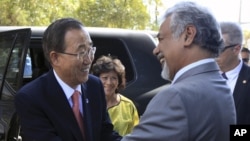JAKARTA — United Nations Secretary General Ban Ki-moon says East Timor is ready for U.N. peacekeeping troops to withdraw as planned by the end of 2012. During a two day visit, the U.N. secretary general also stressed the need to bring human rights abusers to justice, a notion that, for now, is at odds with the country’s development plans.
Brutally occupied by Indonesia for 24 years, the tiny half-island nation of East Timor was granted independence in 2002.
But after it veered to the brink of civil war in 2006, some 3,000 U.N. military, police and civilian forces were deployed to ensure the country’s stability.
U.N. Secretary General Ban Ki-moon told a news conference in Dili Wednesday that the country is preparing for the several hundred remaining troops to leave.
"Timor-Leste [East Timor] does not need U.N. peacekeeping operations at this time," he said. "The National Police of Timor-Leste, they have strengthened their capacity, they have successfully helped the three rounds of presidential and parliamentary elections since they have taken ownership and leadership since March 2011."
This year has been viewed as a key marker of East Timor’s progress and for the most part, things have gone well.
The country’s presidential and parliamentary elections ran relatively smoothly - a key test for the planned withdrawal of U.N. troops at the end of the year.
In response to statements from rights groups such as Amnesty International, the U.N. head also noted that perpetrators of past rights abuses would be brought to justice.
Jakarta-based analyst Edward Rees says such action is seemingly at odds with East Timor’s current development model.
“It is certainly out of step with everything the Timorese government has been saying for at least the last five years," said Rees. "And if the U.N. is calling for justice for the events of '75 to 1999, then you would think they would be doing it at the Security Council, as opposed to in Dili, because the power to pursue those issues lies in Washington and Tokyo and London and Canberra and not in Dili.”
Between 100,000 and 200,000 East Timorese were killed during Indonesia’s quarter century long occupation of East Timor and human rights abuses were widespread.
But East Timor’s leaders have consistently favored pursuing economic development over due process for past crimes.
With a huge reliance on natural resources and almost half of the population scraping a living from subsistence farming - East Timor has major development challenges ahead.
Brutally occupied by Indonesia for 24 years, the tiny half-island nation of East Timor was granted independence in 2002.
But after it veered to the brink of civil war in 2006, some 3,000 U.N. military, police and civilian forces were deployed to ensure the country’s stability.
U.N. Secretary General Ban Ki-moon told a news conference in Dili Wednesday that the country is preparing for the several hundred remaining troops to leave.
"Timor-Leste [East Timor] does not need U.N. peacekeeping operations at this time," he said. "The National Police of Timor-Leste, they have strengthened their capacity, they have successfully helped the three rounds of presidential and parliamentary elections since they have taken ownership and leadership since March 2011."
This year has been viewed as a key marker of East Timor’s progress and for the most part, things have gone well.
The country’s presidential and parliamentary elections ran relatively smoothly - a key test for the planned withdrawal of U.N. troops at the end of the year.
In response to statements from rights groups such as Amnesty International, the U.N. head also noted that perpetrators of past rights abuses would be brought to justice.
Jakarta-based analyst Edward Rees says such action is seemingly at odds with East Timor’s current development model.
“It is certainly out of step with everything the Timorese government has been saying for at least the last five years," said Rees. "And if the U.N. is calling for justice for the events of '75 to 1999, then you would think they would be doing it at the Security Council, as opposed to in Dili, because the power to pursue those issues lies in Washington and Tokyo and London and Canberra and not in Dili.”
Between 100,000 and 200,000 East Timorese were killed during Indonesia’s quarter century long occupation of East Timor and human rights abuses were widespread.
But East Timor’s leaders have consistently favored pursuing economic development over due process for past crimes.
With a huge reliance on natural resources and almost half of the population scraping a living from subsistence farming - East Timor has major development challenges ahead.
